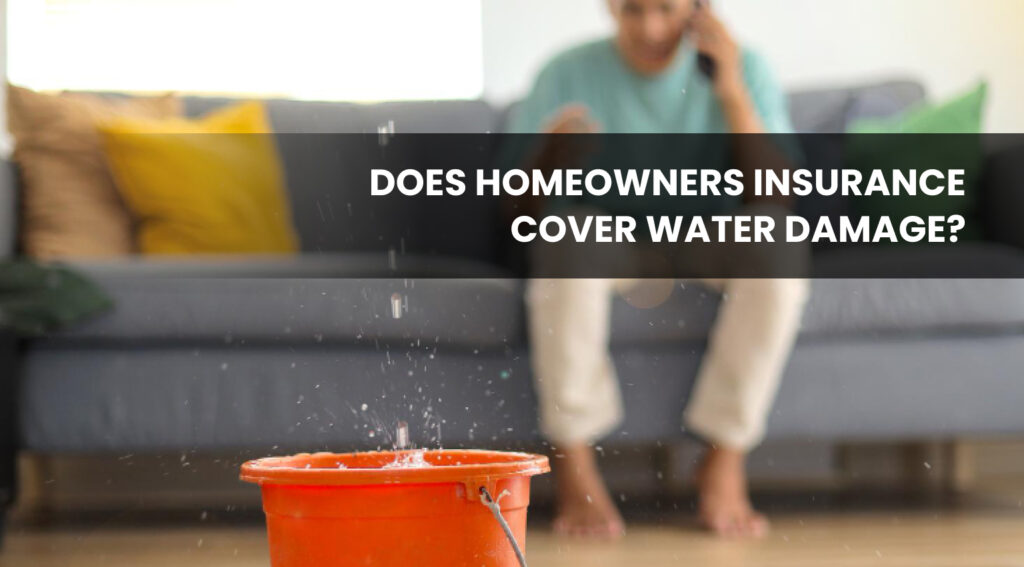
Does Homeowners Insurance Cover Water Damage?
Water damage has a way of showing up uninvited: a burst pipe at 2 a.m., a washing machine gone rogue, or that mysterious ceiling stain that wasn’t there yesterday. It’s one of those problems that makes every homeowner’s heart skip a beat.
But before panic sets in, one question usually comes to mind: Does my homeowners insurance cover this?
The answer isn’t always black and white. It depends on how, where, and why the water decided to make an appearance.
Let’s take a clear, expert look at when homeowners insurance steps in and when it doesn’t.
When Water Damage Is Covered
Sudden and accidental water damage is typically covered by most homeowners insurance policies. That means if the problem is quick to arise, coming without any warning, then you are probably covered.
You know the kind of thing—maybe a pipe bursts and you find yourself knee-deep in water, or your hot water heater springs a leak that now covers your garage floor, or the dishwasher overflows and creates what feels like its own little lake inside your kitchen.
Insurance typically helps pay for damage to your home and cleanup, as well as replacement of lost belongings. The point is that it has to be an event, not something slowly leaking out in the background over months.
When Water Damage Isn’t Covered
Not every water loss is supported by your insurance carrier. As a rule, negligence: such as not properly keeping up your home or from outside flooding isn’t covered under homeowners insurance for water damage.
Among those usually not covered are the following:
- You didn't take care of hidden seepage or smaller leaks on time.
- Damage from decay, mold, or rust.
- Leaking in through the windows, basement or foundation.
- Floods from strong winds, heavy rains or swollen rivers.
Although floods are technically considered water damage, they are considered a separate risk. To protect yourself from flooding, you will require separate flood insurance. You can buy this insurance through the National Flood Insurance Program (NFIP) or from a private provider.
Optional Add-Ons
Not all hope is lost when it comes to those “almost covered” situations. You can often add endorsements (extra coverage options) to your policy to handle issues like:
- Sewer or drain backups—coverage for damage caused by water backing up through drains or sump pumps.
- Mold remediation—coverage to help handle cleanup if mold results from a covered water event.
These add-ons can be worth every penny, especially if your home has a basement or older plumbing.
Preventing Water Damage Before It Happens
So while insurance assists you in the recovery out of a jam, prevention is to save you the hassle altogether. Some of these proactive actions can help a lot:
- Locate leaks by examining beneath sinks and around appliances, as well as behind the toilet.
- Replace old hoses and worn seals on washing machines and dishwashers.
- Clear gutters and downspouts to prevent water from accumulating.
- Get a water leak detector or an automatic shut-off valve. It’s tech that is modern but can save you grand on the spot.
What to Do When Water Damage Occurs
If you discover water damage, don’t waste a moment:
- Stop the source of the water immediately.
- Document the damage with clear photos and videos.
- Contact your insurance provider to file a claim promptly.
- Mitigate further damage by drying out wet areas and removing affected items if safe to do so.
Being quick and organized helps ensure your claim is processed smoothly and fairly.
The Expert Takeaway
Homeowners insurance is meant to cover you when life takes a sudden turn, but it doesn’t mean that’s always how things go.
Sudden leaks and accidental overflows? - Covered.
Long-term neglect or floodwater? - Usually not.
The best strategy is to review your policy regularly and add extra protection where necessary. Besides, peace of mind shouldn’t come with fine print.
When you need someone to guide you and also shield you, call e360 Insurance Services. We have a team of experts who can guide California homeowners to both understand their coverage and also make sure they are choosing a policy that will actually protect what is most important—their home, their comfort, and their peace of mind.
